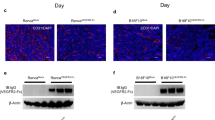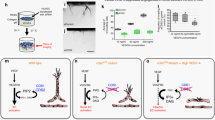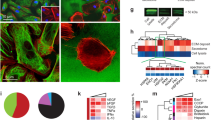Abstract
Chronic systemic delivery of therapeutic proteins, such as inhibitors of angiogenesis, present a number of difficult pharmacological challenges. To overcome these problems for one such protein, we constructed retroviral and adenoviral vectors that express a novel, secretable form of the antiangiogenic protein, platelet factor 4 (sPF4). Vector-mediated sPF4 transduction selectively inhibits endothelial cell proliferation in vitro, and results in hypovascular tumors that grow slowly in vivo. Additionally, tumor-associated angiogenesis is inhibited and animal survival is prolonged, following transduction of established intracerebral gliomas by an sPF4-expressing adenoviral vector. These data support the concept that targeted antiangiogenesis, using virally mediated gene transfer, represents a promising strategy for delivering antiangiogenic therapy.
This is a preview of subscription content, access via your institution
Access options
Subscribe to this journal
Receive 12 print issues and online access
$209.00 per year
only $17.42 per issue
Buy this article
- Purchase on Springer Link
- Instant access to full article PDF
Prices may be subject to local taxes which are calculated during checkout
Similar content being viewed by others
References
Folkman, J. Tumor angiogenesis: Therapeutic implications. New Engl. J. Med. 285, 1182–1186 (1971).
Brem, S., Cotran, R. & Folkman, J. Tumor angiogenesis: A quantitative method for histologic grading. J.Natl. Cancer Inst. 48, 347–356 (1972).
Brem, S. The role of vascular proliferation in the growth of brain tumors. Clin. Neurosurg. 23, 440–453 (1976).
Maxwell, M. et al. Expression of angiogenic growth factor genes in primary human astrocytomas may contribute to their growth and progression. Cancer Res. 51, 1345–1351 (1991).
Shweiki, D., Itin, A., Softer, D. & Keshet, E. Vascular endothelial growth factor induced by hypoxia may mediate hypoxia-initiated angiogenesis. Nature 359, 843–845 (1992).
Plate, K.H., Breier, G. Weich, H.A. & Risau, W. Vascular endothelial growth factor is a potential tumour angiogenesis factor in human gliomas in vivo. Nature 359, 845–848 (1992).
O'Reilly, M.S. et al. Angiostatin: A novel angiostatin inhibitor that mediates the suppression of metastases by a Lewis lung carcinoma. Cell 79, 315–328 (1994).
Ingber, D. et al. Synthetic analogues of fumagillin that inhibit angiogenesis and suppress tumor growth. Nature 348, 555–557 (1990).
D'Amato, R.J., Loughnan, M.S., Flynn, E. & Folkman, J. Thalidomide is an inhibitor of angiogenesis. Proc. Natl. Acad. Sci. USA 91, 4082–4085 (1994).
Maione, T.E. et al. Inhibition of angiogenesis by recombinant human platelet factor-4 and related peptides. Science 247, 77–79 (1990).
Maione, T.E., Gray, G.S., Hunt, A.J. & Sharpe, R.J. Inhibition of tumor growth in mice by an analogue of platelet factor 4 that lacks affinity for heparin and retains potent angiostatic activity. Cancer Res. 51, 2077–2083 (1991).
Sharpe, R.J., Byers, H.R., Scott, C.F., Bauer, S.I. & Maione, T.E. Growth inhibition of murine melanoma and human colon carcinoma by recombinant human platelet factor 4. J. Natl. Cancer Inst. 82, 848–853 (1990).
Staddon, A. & Bonnem, E. A randomized dose finding study of recombinant platelet factor 4 (rPF4) in cutaneous AIDS-related Kaposi's sarcoma (KS). Proc. Am. Soc. Clin. Oncol. 13, 3 (1994).
O'Reilly, M.S., Holmgren, L., Chen, C. & Folkman, J. Angiostatin induces and sustains dormancy of human primary tumors in mice. Nature Med. 2, 689–692 (1996).
Millauer, B., Shawver, L.K., Plate, K.H., Risau, W. & Ullrich, A. Glioblastoma growth inhibited in vivo by a dominant-negative Flk-1mutant. Nature 367, 576–579 (1994).
Weinstat-Saslow, D.L., Zabrenetzky, V.S., Frazier, W.A., Roberts, D.D. & Steeg, P.S. Transfection of thrombospondin 1 complementary DNA into a human breast carcinoma Cell line reduces primary tumor growth, metastatic potential and angiogenesis. Cancer Res. 54, 6504–6511 (1994).
Millauer, B. et al. Dominant-negative inhibition of Flk-1 suppresses the growth of many tumor types in vivo. Cancer Res. 56, 1615–1620 (1996).
Rice, C.D. & Merchant, R.E. Systemic treatment with murine recombinant interleukin-1β inhibits the growth and progression of malignant glioma in the rat. J. Neuro-Oncol. 13, 43–55 (1992).
Takamiya, Y., Brem, H., Ojeifo, J., Mineta, T. & Martuza, R.L. AGM-1470 inhibits the growth of human glioblastoma Cells in vitro and in vivo. Neurosurgery 34, 869–875 (1994).
Holmgren, L., O'Reilly, M.S. & Folkman, J. Dormancy of micrometastases: Balanced proliferation and apoptosis in the presence of angiogenesis suppression. Nature Med. 1, 149–153 (1995).
Alon, T. et al. Vascular endothelial growth factor acts as a survival factor for newly formed retinal vessels and has implications for retinopathy of prematurity. Nature Med. 1, 1024–1028 (1995).
Hamada, J., Cavanaugh, P.G., Lotan, O. & Nicolson, G.L. Separable growth and migration factors for large Cell lymphoma Cells secreted by microvascular endothelial Cells derived from target organs for metastasis. Br. J. Cancer 66, 349–354 (1992).
Graeber, G.G. et al. Hypoxia-mediated selection of Cells with diminished apoptotic potential in solid tumors. Nature 379, 88–91 (1996).
Fine, H.A. Prospects for gene therapy as an innovative approach to malignant gliomas. Perspect. Neural. Surg. 5, 115–127 (1994).
Chen, S.-H., Shine, H.D., Goodman, J.C. Grossman, R.G. & Woo, S.L.C. Gene therapy for brain tumor: Regression of experimental gliomas by adenovirus-mediated gene transfer in vivo. Proc. Natl. Acad. Sci. USA 91, 3054–3057 (1994).
Dong, Y. et al. In vivo replication-deficient adenovirus vector-mediated transduction of the cytosine deaminase gene sensitizes glioma Cells to 5-fluorocytosine. Hum. Cene Ther. 7, 713–720 (1996).
Hochberg, F.H. & Pruitt, A. Assumptions in the radiotherapy of glioblastomas. Neurology 30, 907–991 (1980).
McGrory, W.J., Bautista, D.S. & Graham, F.L. A simple technique for the rescue of early region 1 mutations into infectious human adenovirus type 5. Virology 163, 614–617 (1988).
Graham, F.L., Smiley, J., Russel, W.C., St Nairn, R. Characteristics of a human Cell line transformed by DNA from human adenovirus type 5. J. Gen. Virol. 36, 59–72 (1977).
Takamiya, Y., Friedlander, R.M., Brem, H., Malick, A. & Martuza, R.L. Inhibition of angiogenesis and growth of human nerve-sheath tumors by AGM-1470. J. Neurosurg. 78, 470–476 (1993).
Author information
Authors and Affiliations
Rights and permissions
About this article
Cite this article
Tanaka, T., Manome, Y., Wen, P. et al. Viral vector-mediated transduction of a modified platelet factor 4 cDNA inhibits angiogenesis and tumor growth. Nat Med 3, 437–442 (1997). https://doi.org/10.1038/nm0497-437
Received:
Accepted:
Issue Date:
DOI: https://doi.org/10.1038/nm0497-437
This article is cited by
-
Oncolytic herpes simplex virus immunotherapy for brain tumors: current pitfalls and emerging strategies to overcome therapeutic resistance
Oncogene (2019)
-
A New Approach in Gene Therapy of Glioblastoma Multiforme: Human Olfactory Ensheathing Cells as a Novel Carrier for Suicide Gene Delivery
Molecular Neurobiology (2016)
-
Role of platelet chemokines, PF-4 and CTAP-III, in cancer biology
Journal of Hematology & Oncology (2013)
-
Platelet factor-4 and its p17-70 peptide inhibit myeloma proliferation and angiogenesis in vivo
BMC Cancer (2011)
-
Platelet-derived chemokines: pathophysiology and therapeutic aspects
Cellular and Molecular Life Sciences (2010)



